 Petzlover
Petzlover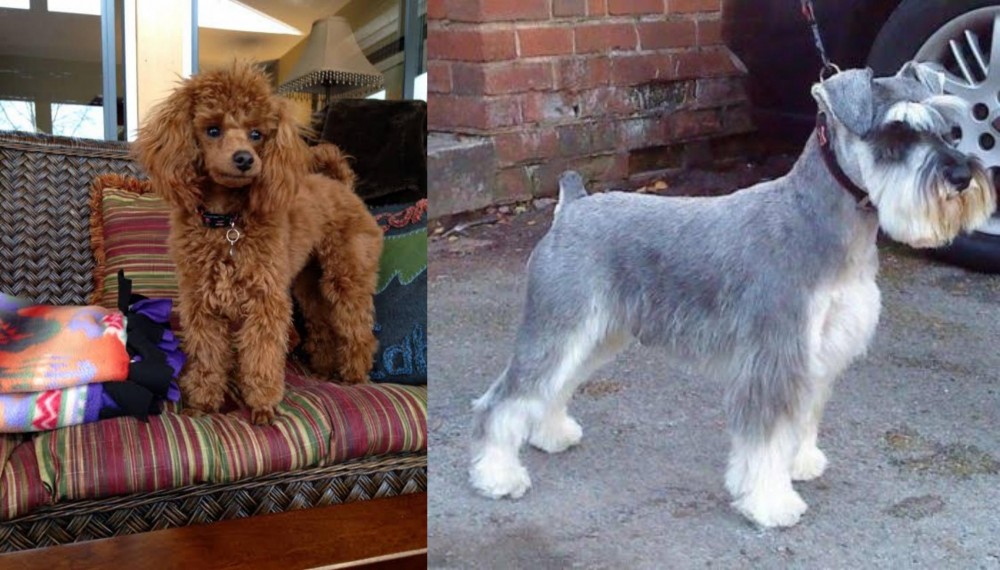 Both Miniature Poodle and Miniature Schnauzer are originated from Germany. Both Miniature Poodle and Miniature Schnauzer are having almost same height. Both Miniature Poodle and Miniature Schnauzer are having almost same weight. Both Miniature Poodle and Miniature Schnauzer has almost same life span. Both Miniature Poodle and Miniature Schnauzer has almost same litter size. Both Miniature Poodle and Miniature Schnauzer requires Moderate Maintenance.
Both Miniature Poodle and Miniature Schnauzer are originated from Germany. Both Miniature Poodle and Miniature Schnauzer are having almost same height. Both Miniature Poodle and Miniature Schnauzer are having almost same weight. Both Miniature Poodle and Miniature Schnauzer has almost same life span. Both Miniature Poodle and Miniature Schnauzer has almost same litter size. Both Miniature Poodle and Miniature Schnauzer requires Moderate Maintenance.
 The Poodle is no stranger to the dog world and has been a familiar face in Western Europe for hundreds of years. Though they have lived in Europe for centuries, their origins are unsure, with some saying they hail from Germany and others say France.
The Poodle is no stranger to the dog world and has been a familiar face in Western Europe for hundreds of years. Though they have lived in Europe for centuries, their origins are unsure, with some saying they hail from Germany and others say France.
The Miniature Poodles have been used in both countries as gundogs for water birds.
They have always been admired for their intelligence, and Miniature Poodles are believed to have been bred from Standard Poodles. It is interesting to note the 3 official sizes of the Poodle are Toy, Miniature and Standard – all considered one breed and judged according to the same written standard, just with different size requirements.
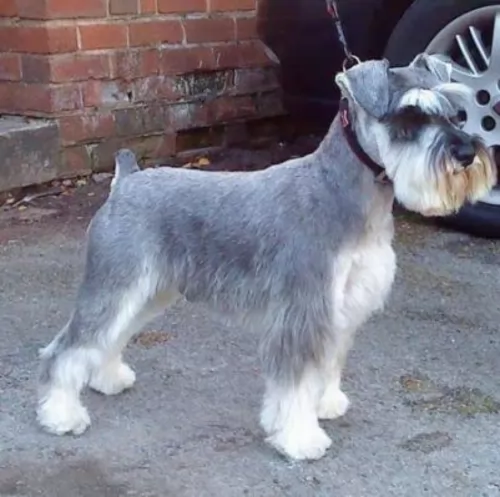 Miniature Schnauzers were first bred in Germany in the 19th century being bred from Affenpinschers and Standard Schnauzers.
Miniature Schnauzers were first bred in Germany in the 19th century being bred from Affenpinschers and Standard Schnauzers.
This dog was always used to control rats on farms, but these days he is more a companion. It is believed that the start of the modern Miniature Schnauzer in the United States was around 1924 when dogs were imported from Germany.
It was in 1933 that the Miniature Schnauzer was recognized by the AKC as a separate breed from the Standard Schnauzer.
 With good care the lifespan of the Miniature Poodle is 14 – 16 years of age. This purebreed dog is small, standing at 28 – 38cm in height and weighing 7 – 8kg.
With good care the lifespan of the Miniature Poodle is 14 – 16 years of age. This purebreed dog is small, standing at 28 – 38cm in height and weighing 7 – 8kg.
The coat is typically curly, springy and dense. Colors of the coat can be cream, beige, silver, black, brown or apricot. They are low shedding dogs and are regarded as being hypoallergenic. The ears are floppy and the tail is usually docked to give the dog a nice, compact look.
The Miniature Poodle is intelligent and learns easily, so you won’t have any trouble with training him and having him socialized.
He is a lively dog and loves a game and a walk, loving as much time as possible spent with his human family. He gets on well with other pets in the home as well as with children who have been taught to be kind and gentle with animals.
They are not overly-friendly with strangers, and therefore make excellent watchdogs. They’re the kind of dogs who need both physical and mental stimulation though, and he won’t be content to be left and ignored – after all he counts himself as a member of your family! They make wonderful pets, being playful and energetic and loving water, always ready to swim with you.
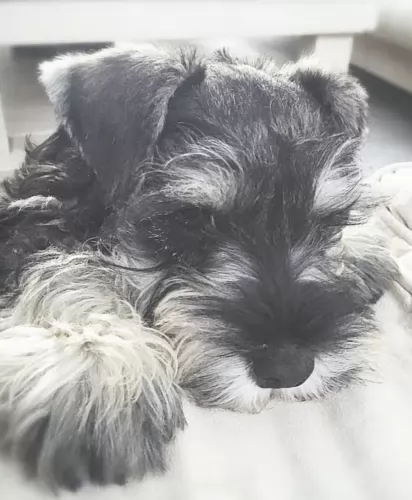 The Miniature Schnauzer is a small dog breed that stands between 30 to 36cm in height and weighs between 5 and 10kg.
The Miniature Schnauzer is a small dog breed that stands between 30 to 36cm in height and weighs between 5 and 10kg.
He has a sturdy body with a dense, wiry coat which most people prefer to have stripped. Because stripping is quite tedious, many of these dog owners prefer to have the coat clipped which actually gives the coat a greyish look to it.
The coat is usually a mix of black and silver. Some people refer to the Miniature Schnauzer as having a salt-and-pepper coat – hairs that are a mix of black and white. The dog has a double coat with the outer coat being wiry and the undercoat being a lot softer.
This is a dog that will need to be groomed frequently to prevent matting. A noticeable feature with these dogs is the rectangular shaped head with alert slanted eyes and bushy eyebrows, mustache and beard. In fact the word ‘Schnauzer’ means beard or muzzle.
The ears have been traditionally cropped but these days they are left and then they tend to be half-erect, half-floppy.
This is a tough little dog, fearless, cheeky, arrogant, alert and also friendly. A draw-card with him is that he is considered as a low-shedder and being hypoallergenic.
They’re very intelligent dogs too and will learn quickly when you give him training and socialization. This is important for a dog like this as he can quickly show you that he is strong willed and independent. Training and socialization makes him much nicer as he becomes more balanced and obedient.
He is full of life and extroverted and you can count on him to join you wherever you are and whatever you’re doing. Whether watching TV, swimming or hiking, he’ll be there and turn every occasion into a festive event. He is a loving, loyal dog, making a splendid pet.
He's protective of his human family and tends to be suspicious of strangers, and this is what makes him such a great watchdog.
 When you take a Miniature Poodle into your home and your heart, there are many wonderful positive aspects that come with him.
When you take a Miniature Poodle into your home and your heart, there are many wonderful positive aspects that come with him.
You won’t have any trouble training him as he is clever and bright. He is such a loving, loyal pet and he takes his job of guarding you seriously too.
Because they aren’t aggressive, they're easy to keep in the city or the countryside, so long as he receives plenty of love, companionship and exercise. Perhaps the only thing that may require a little bit of effort on your part is the fact that his coat will require quite a bit of upkeep to keep it looking good and healthy.
In exchange for looking after him, you’re going to benefit from having a wonderful canine friend and family pet in your life for many years.
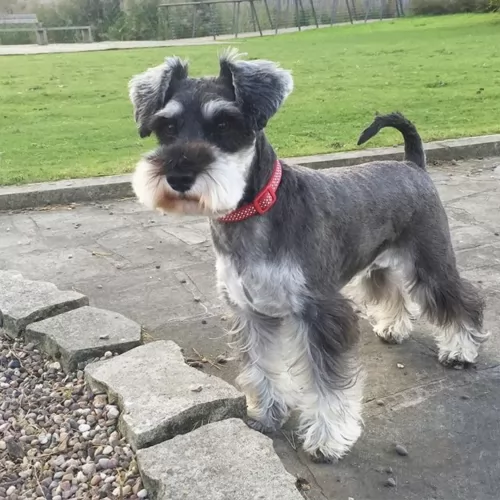 Miniature Schnauzers are such adaptable little dogs, quite happy to make a home with you in the city or in the countryside.
Miniature Schnauzers are such adaptable little dogs, quite happy to make a home with you in the city or in the countryside.
They’re sociable dogs, so just being with his human family wherever they are will suit him well. If he lives in the city however, he will need to have a walk everyday or taken to the park for a run.
He is also a dog that scarcely sheds, so he suits people battling with allergies. With an average life expectancy of 12 to 14 years, if you nurture your Mini Schnauzer and give him the best food and exercise there is, as well as loving him, you’re going to have a loyal and devoted pet.
 Dog’s thrive on good nutrition and exercise, and if your Miniature Poodle gets both of these combined with plenty of love, he can live to be up to 16 years of age and even older.
Dog’s thrive on good nutrition and exercise, and if your Miniature Poodle gets both of these combined with plenty of love, he can live to be up to 16 years of age and even older.
They are robust little dogs, but even so, they can get sick. Ear infections, joint diseases, obesity, dental disease and bloat are common dog diseases to look out for -
This is a life-threatening condition where your pet’s stomach fills with gas. The swollen stomach puts pressure on the diaphragm and the dog battles to breathe. The dog could also vomit, be drooling and lethargic.
The stomach can also twist putting the dog in shock. This bloating can occur with any dog breed and efforts can be made to avoid it by feeding the dog smaller more frequent meals as opposed to one larger meal which he gobbles up.
The dog shouldn’t exercise immediately after a meal either. You also want to avoid obesity at all costs.
When the mitral valve malfunctions, blood isn’t being pumped out of the heart to the rest of the body. If the mitral valve weakens or leaks it can lead to endocarditis.
Quite a number of dogs develop some form of heart disease during their lifetime, with a high percentage being due to mitral valve insufficiency, which is more common in smaller dogs.
Your dog may have a cough, be lethargic and lose weight. The first signs of a leaking mitral valve is a heart murmur. At first MVI doesn’t have obvious clinical signs, but with time the efficiency of the heart is reduced and congestive heart failure develops. Your veterinarian will evaluate your pet and suggest treatment.
A skin problem sounds fairly mild but it can cause havoc in your pet’s life, causing him to be constantly licking and scratching himself. The hair becomes dull and brittle, and breaking the skin from continuous scratching invites bacterial infection. These skin infections will require veterinary intervention.
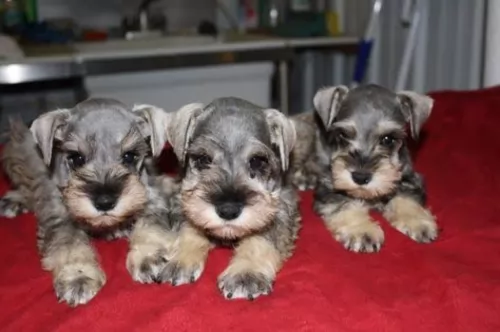 Your Miniature Schnauzer is pretty healthy and he isn’t likely to cost you much in terms of vet fees. There are however some common dog problems that you want to be aware of such as cataracts of the eye and hypothyroidism.
Your Miniature Schnauzer is pretty healthy and he isn’t likely to cost you much in terms of vet fees. There are however some common dog problems that you want to be aware of such as cataracts of the eye and hypothyroidism.
This a a problem in the lens of the eye. The lens should be clear, and when a dog has a cataract, it obscures the vision. The size of the cataract can lead to blindness.
Diabetes in a dog can bring on cataracts as can genetics or damage to the eye from exposure to ultraviolet light. Fortunately, dogs with cataracts can still see. Dogs with old cataracts can have surgery to remove them.
When a dog owner suspects a cataract in their pet’s eye it is best to treat it immediately with anti-inflammatory dog cataract eye drops. Cataracts never go away however without surgery.
The thyroid gland in the neck produces a hormone called thyroxine. It controls metabolism, but with hypothyroidism, enough of the hormone isn’t made. Its a common disease which affects all dog breeds.
Signs of hypothyroidism include hair loss, weight gain, intolerance to cold and a troublesome skin. To have the disease diagnosed, the vet will do a series of blood tests.
 If you opt to keep your Miniature Poodle’s coat long, it will actually require regular brushing – every day in fact, if you want to avoid matting and tangling. Most people don’t like the work this involves and they have their Poodle’s hair cut short all over, then he only needs a brush once or twice a week. Your Miniature Poodle just loves the time you spend with him grooming him. It’s your time to feel for any unusual lumps and to also check for fleas and ticks. Some people take their pet to the doggy parlor to have the coat clipped.
If you opt to keep your Miniature Poodle’s coat long, it will actually require regular brushing – every day in fact, if you want to avoid matting and tangling. Most people don’t like the work this involves and they have their Poodle’s hair cut short all over, then he only needs a brush once or twice a week. Your Miniature Poodle just loves the time you spend with him grooming him. It’s your time to feel for any unusual lumps and to also check for fleas and ticks. Some people take their pet to the doggy parlor to have the coat clipped.
The dog’s nails should also be trimmed regularly, and their ears also need to be checked for wax buildup and debris which can lead to an ear infection.
Teeth need to be checked over too because dental disease won’t only lead to loss of teeth but it could be toxic for important body organs too.
Wipe around your pet’s eyes as tear stains can form under the eyes.
Make sure to feed your pet a top quality diet full of vitamins and minerals. Get to know the foods which can be toxic for your pet and cause stomach upsets. Dogs appreciate simplicity and consistency with their diets, and apart from dry kibble, home-made food such as boiled chicken, brown rice and vegetables can be excellent for your pet.
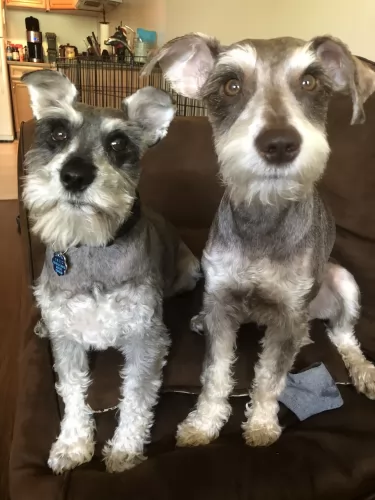 Let’s look at several ways you need to care for your Miniature Schnauzer -
Let’s look at several ways you need to care for your Miniature Schnauzer -
Make sure you have his puppy injections on time. This means knowing which veterinarian you’ll use. Later on if you don’t want to go in for breeding, you will need to have your pet spayed or neutered.
Make sure you have a nice warm, dry spot for your dog to sleep. It can be a cardboard box, or you can buy a dog basket or sleeping platform. Make sure your pet loves it and knows he can retreat to it anytime he wants.
If he goes outside for a few hours, make sure that he has a place to lie in the shade and away from the elements.
Good food promotes good health and longevity. You can feed your pet one of the top quality commercially manufactured foods and give your pet some variety by adding in some boiled chicken, vegetables and brown rice. Some raw meat occasionally can also be excellent for your pet.